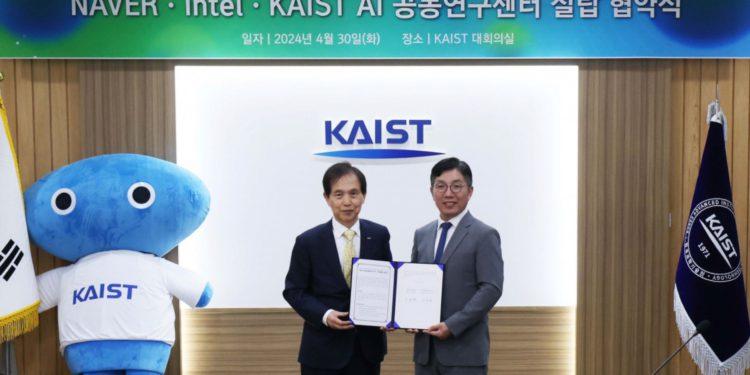Naver, Intel, and the Korea Advanced Institute of Science and Technology (KAIST) have announced plans to establish a collaborative AI research lab named the NIK AI Research Center. Situated on the KAIST campus in Daejeon, the lab aims to spearhead advancements in artificial intelligence semiconductors.
Operations are expected to commence in July, with a projected three-year lifespan, extendable based on research outcomes and organizational requirements. This joint initiative is a collaboration between industry and academia in AI development.
The NIK AI Research Center, set to be operational by the first half of this year, aims to innovate in AI semiconductor technology and software, leveraging the expertise of Naver, Intel, and KAIST. The collaboration will use Naver Cloud’s diverse AI capabilities, Intel’s AI chip technology, and KAIST’s renowned research expertise to create a novel ecosystem in the AI semiconductor sector.
KAIST officials highlighted the synergy among these entities, emphasizing the potential for innovation in AI chip development.
The joint research center will focus on advancing AI software for natural language processing and machine learning. Intel is spearheading 20 to 30 industry-academic research projects for the GAUDI platform ecosystem, with Naver contributing its cloud-based GAUDI2 technology to facilitate research endeavors at KAIST.
Research will predominantly focus on developing open-source software for AI applications such as natural language processing, computer vision, and machine learning. Of this, 50 percent will go to open-subject research, 30 percent to lightweight AI chips, and 20 percent to optimize their performance.
The joint AI lab will be overseen by Kim Joung-ho, a professor of electrical engineering at KAIST, and Lee Dong-soo, executive director of Hyperscale AI Efficiency at Naver Cloud. Together, they will lead efforts to advance research in AI development, chip design, and software development, utilizing Intel’s Gaudi series for technological expertise.
Kim highlighted the importance of the collaboration, stating that it will enable KAIST to acquire essential knowledge in AI development and chip design while also providing valuable experience operating large-scale data centers. Establishing the joint research center is crucial in securing the necessary AI computing infrastructure for future research and development endeavors.
The decision to establish the joint AI lab follows a recent partnership announcement between Naver and Intel at the Intel Vision 2024 keynote session in Phoenix. Intel pledged to provide IT infrastructure based on its next-generation AI accelerator, Gaudi, enabling partners to pursue software development and engage in industrial and academic research.
With Intel’s chip support, KAIST aims to annually publish its research findings, leveraging the technical expertise gained in AI development, semiconductor design, and software operation through the Gaudi series.
Naver Cloud, in collaboration with KAIST, anticipates conducting a range of research endeavors work on the AI ecosystem focused on HyperClovaX. Director Lee Dong-soo expressed optimism that the joint research center will contribute to the vitality of domestic AI research and enhance the diversity of the AI chip ecosystem.
Also Read:
- LG and Kakao Mobility Collaborate for Robot Last-Mile Delivery
- Collaborative Effort: South Korean Telecom Leaders Accelerate Rural 5G Deployment
- Samsung Boosts Chip Production Capabilities through Partnership with ZEISS Group
- Korean Air, Hyundai, KT Lead Successful UAM Operations in Test
- Hyundai Unveils ST1: Electric Work Vans with Futuristic Design
- KT Launches Responsible AI Center: Safeguarding the Future of Artificial Intelligence







